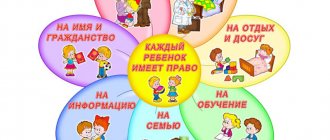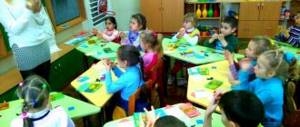Speech at a parent meeting in front of parents of future first-graders. article on speech therapy
Speech by a speech therapist at a parent meeting for parents of future first-graders.
Topic:
“Speech readiness for school. Difficulties of first-graders with speech impairments in learning to read and write.”
The purpose of the speech: to attract the attention of parents to speech deficiencies in children, to reveal the impact of these deficiencies on academic performance, primarily in the Russian language and reading.
Every parent looks forward to the long-awaited and important moment when their beloved child goes to first grade. Entering school is an extremely important moment in a child's life. With the arrival of school, the child’s usual way of life changes. A preschooler becomes a schoolchild.
But has everything been done to ensure that the child is ready for school? Is his speech sufficiently developed? After all, his success in mastering absolutely all subjects of the school curriculum will depend on this! Readiness for schooling presupposes, first of all, motivation to learn, i.e. the child must have a desire to go to school. He must be able to communicate with peers, fulfill the teacher’s requirements, and control his behavior.
The basis of learning is the cognitive process. It is known that the pinnacle of the cognitive process is thinking and speech. Therefore, readiness or unpreparedness for schooling is largely determined by the level of speech development of the child. After all, it is with the help of oral and written speech that the child has to master the entire system of knowledge. The better his speech is developed before entering school, the faster the student will master reading and writing.
Let's consider what speech readiness for school is.
To successfully master reading and writing, children must develop the following components of speech before starting school:
1. Children must be able to listen and hear others.
If these skills are not developed, children may have difficulties in mastering the material presented orally by the teacher.
2. Sound side of speech:
— The child must pronounce all speech sounds correctly.
Correct pronunciation of speech sounds and clear distinction of speech sounds by ear are a prerequisite for mastering writing.
— Clearly and distinctly pronounce words and phrases with complex sound and syllabic content (for example: motorcyclist, traffic controller, thermometer).
- Speak loudly or quietly, or even in a whisper, depending on the situation.
- Change the pace of speech taking into account the content of the statement.
As a rule, minor violations of the sound side of speech do not affect the success of further learning. Pronounced violations in this area lead to incorrect pronunciation being reflected in writing due to reliance on incorrect pronunciation. Writing is a reflection of oral speech. The child writes the way he speaks. Substitutions and omissions of letters may appear in the letter, corresponding to substitutions and omissions of sounds in oral speech (fur coat - “suba”, beetle - “zuk”, star - “zveda”, fish - “lyba”). Failure to master these skills can lead to reading errors.
3. Functions of language analysis.
Children should be able to:
- divide sentences into words;
- divide words into syllables;
- be able to identify all the sounds in words;
- establish the sequence of sounds in a word.
Underdevelopment of the functions of language analysis and synthesis manifests itself in writing in the distortion of the structure of words and sentences. The most common errors are:
- continuous spelling of words, especially prepositions with other words; separate spelling of words, especially prefixes and roots (in the house - “in the house”, came - “on stepped”);
- omissions, rearrangements, additions of syllables (room - “cat”, cookies - “chepene”, steam locomotive - “pavoroz”, grandmother - “grandmother”);
- omissions of consonants when they come together; omission of vowels, addition of letters (pig - “grass”, grass - “tarawa”);
- permutations of letters (room - “konmata”).
4. Lexical side of speech (vocabulary).
Children should be able to:
- choose words accurately;
- clearly express your thoughts, connecting various facts into a single whole;
- differentiate the designations of objects (for example: “passenger car and truck, and not just a car”, “winter and summer shoes”);
- use complex words (for example: long-legged);
- use epithets (for example: open field);
- select metaphors (for example: a cloud of mosquitoes);
- use words and phrases with a figurative meaning (for example: headlong);
- select synonyms (for example: brave - courageous - courageous). Underdevelopment of the lexical side of speech affects reading comprehension, even with technically correct reading. Such children have difficulty understanding the meaning of words, sentences, and texts they read. Metaphors and comparisons are especially difficult. In high school, errors occur in the selection of test words in writing.
5. The grammatical side of speech.
Children should develop inflection and word formation skills:
a) Inflection skills:
Children should be able to:
- change nouns by cases and numbers (for example: sled, on a sled);
- use various prepositions;
- agree nouns with adjectives in gender, number, case (for example: blue towel);
- coordinate nouns with numerals (for example: one pencil, two pencils, five pencils);
- use verbs correctly (for example: run, run, runs, run, run, ran, will run, etc.).
Due to the underdevelopment of the grammatical structure of speech, agrammatisms can be observed in writing and reading, manifested in a distortion of the morphological structure of the word:
- errors in case endings and when changing the number of nouns (in Bori - “in Bory”, in many trees - “many trees”, in sled - “in sank”);
- omissions, substitutions of prepositions (over the table - “on the table”, went to the forest - “went to the forest”);
— coordination errors (white house - “white house”, “five cherries - “five cherries”, blue towel - “blue towel”).
b) Word formation skills:
Children should be able to:
- form words using diminutive and augmentative suffixes (for example: eyes - eyes - eyes);
- form verbs using prefixes (for example: walked - went out - crossed - walked around);
- form the name of baby animals;
- form relative and possessive adjectives from nouns (for example: raspberry - raspberry, fox - fox).
If a first-grader has not developed word-formation skills, then when writing the following may be observed:
- replacement of suffixes (kolyaty - “little goats”);
— replacement of consoles (overwhelmed - “overwhelmed”).
There may be difficulties in constructing complex sentences, omissions of sentence members, and violations of the sequence of words in a sentence. Independent written speech may be impaired.
6. Coherent speech.
Coherent speech is usually understood as such expanded (that is, consisting of several or many sentences) statements that allow a person to systematically and consistently express his thoughts.
Children should be able to:
- communicate freely with adults and peers;
- maintain a conversation on age-appropriate topics;
- talk about the events experienced;
- retell the content of a fairy tale or story;
- describe surrounding objects;
- reveal the content of the picture, some phenomena of the surrounding reality.
Violation of independent coherent speech can be expressed in difficulties in retelling, in composing a story, in writing essays and presentations.
Thus, the well-developed speech of a first-grader serves as a means of successful learning not only in writing and reading, but in other subjects at school.
The above-mentioned features of the oral speech of first-graders with disabilities indicate that without targeted speech therapy work to correct deficiencies in the development of all components of speech, children will find it difficult to master the school curriculum in the Russian language, and they may develop a negative attitude towards learning.
To help students with speech disorders, it is necessary to correct oral speech and preventive work to prevent reading and writing disorders.
For this purpose, our school conducts special correctional classes with a speech therapist teacher.
The duration and number of speech therapy sessions for each child depends on the severity and structure of speech underdevelopment. Individual and subgroup correctional classes are conducted. Subgroup classes (30 minutes each) are held 3 times a week. Individual (15-20 minutes) – 2-3 times a week, depending on the severity of the defect.
Main areas of work:
— work on sound pronunciation (production, automation and differentiation of sounds);
— development of phonemic functions (analysis, synthesis, representations);
- development of the lexical and grammatical structure of speech;
- development of coherent speech;
— prevention of dysgraphia and dyslexia.
The success of correctional and educational work to overcome speech deficiencies presupposes the active participation of parents in it. It should not be assumed that the role of parents in the process of speech correction ends at the moment of contacting a specialist. No matter how good a speech therapist is, he will not be able to effectively help the child without the assistance of the parents. Only joint efforts will lead to good results.
In order to correct a speech defect, persistent daily work is required, which should be carried out both in speech therapy classes and at home.
The main task of parents in the process of correctional intervention is to actively interact with the speech therapist. Parents need to be interested in the progress and results of the correction process, seek advice from a specialist on any issues that arise, and conduct speech therapy exercises available at home.
In addition, parents should remember that the speech of adults is a role model for the child, so it is important to communicate with the child in correct Russian.
Thus, thanks to the joint work of a speech therapist, educational psychologist, primary school teachers, and parents, it is possible to promptly and efficiently help children overcome speech disorders, more successfully master program material in the Russian language and reading, and create positive motivation for educational activities.
Good luck to you and your children in school!






